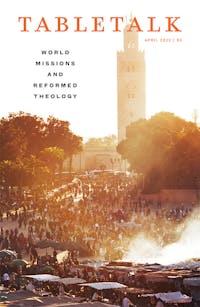
Request your free, three-month trial to Tabletalk magazine. You’ll receive the print issue monthly and gain immediate digital access to decades of archives. This trial is risk-free. No credit card required.
Try Tabletalk NowAlready receive Tabletalk magazine every month?
Verify your email address to gain unlimited access.
What is the goal of world missions? In The Fellowship of the Ring, Frodo and his friends appear before Lady Galadriel at a moment of duress and confusion. Part of their original company has been lost, and they are somewhat wearied and shaken. Galadriel responds with these sobering yet helpful words: “Your Quest stands upon the edge of a knife. Stray but a little and it will fail, to the ruin of all. Yet hope remains while the Company is true.”
In many ways, the church today is in a similar position as Frodo and his friends. Mounting pressures on the church and its leadership come from every direction, especially in the last two years as churches have been divided over issues of politics and science. Eerily consistent with the diverse yet diabolical strategies deployed by Satan in C.S. Lewis’ The Screwtape Letters, the church today is not simply under attack; it has been distracted from its mission.
It is here that we turn to Scripture and take a refresher course both in the goal and in the means of world mission—to declare the glory of God among the nations by preaching the gospel.
In 2 Corinthians 5, beginning in verse 16, Paul asserts that he no longer regards anyone according to the flesh. That is a remarkable statement. Something has happened in history that has changed the way Paul views himself, God, and others. That something is the gospel. Jesus, whom Paul once regarded “according to the flesh,” not only came in the flesh but also died and rose again. For Paul, it was natural to have once regarded Jesus in an earthly, fleshly way. But the resurrection of Jesus changed everything for Paul. Commentators suggest that Paul may likely have encountered Jesus before His death and resurrection (see Acts 22:3). But Paul was then blinded by his own earthly, fleshly vision. The resurrected Christ confronted Paul and forced him to see things—to see the world—differently.
This refined lens on the world is what Paul describes in 2 Corinthians 5:17. The new creation has been inaugurated by the resurrection of Jesus. The way we view people must conform to the way God sees them (as either in or outside Christ). Old things have passed away; new things in Christ have now taken their place. Paul’s view is, in a certain sense, eschatological. He sees the world with the eyes of heaven—the way Jesus sees it.
This new way of seeing people is significant for the mission and identity of the church. Corinth was a large, wealthy city of great means. At its zenith, it was the second-largest city in the ancient world, composed of people from many nations, including Jews and Greeks. If “all roads lead to Rome,” most roads led to Corinth. Its citizens consisted of the “haves” and “have-nots” from leaders in Caesar’s army to manumitted slaves; from wealthy landowners to meager field-workers. Corinth had it all, and Corinth glorified and enjoyed itself. Public debate was a popular form of entertainment and a means of securing both wealth and prominence—a means of self-exaltation.

This is why Paul not only refused to employ “lofty speech or wisdom” in Corinth (1 Cor. 2:1) but also refused to “know nothing among you except Jesus Christ and him crucified” (v. 2). For Paul, Jesus was everything, and seeing the world through Jesus’ eyes meant seeing a world that needed to be reconciled to God through the gospel. Only through the gospel could man rightly “glorify God and enjoy him forever.” The glory of God was the goal of the gospel, and hence the goal of the church’s mission. It should remain the church’s goal today.
This gospel message is what God has entrusted to His servants—to His church. God was in Christ reconciling the world to Himself, and He has committed that good news to us. In an age of distraction and sometimes even discouragement, perhaps what the church needs is a fresh dose of heavenly perspective—to see the world as God sees it, composed of people either inside or outside Christ. It is the gospel alone that can reconcile. It is the gospel alone that the church is called to proclaim. The church in history has always been tempted to stray from its mission, but there is hope, not just because our company holds true but because God has guaranteed our success with the resurrection of His Son and the power of His Spirit, all to the praise of His glory.
